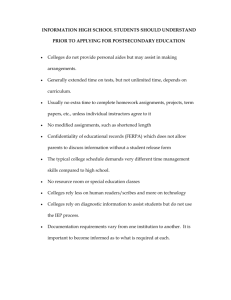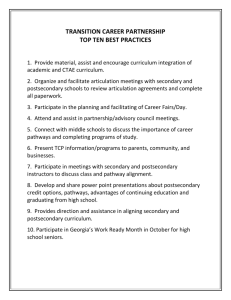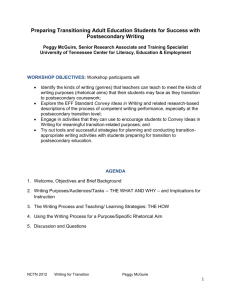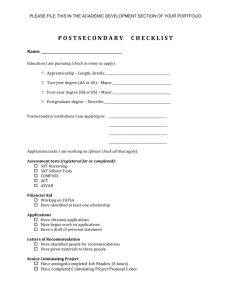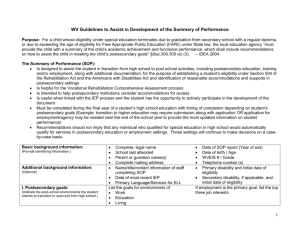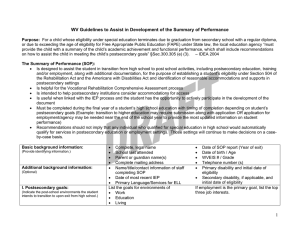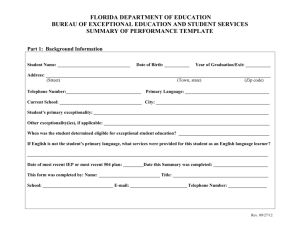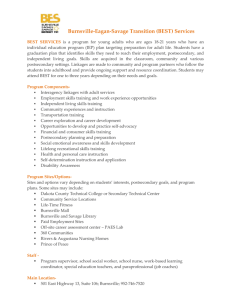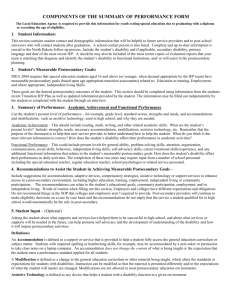Asperger's Syndrome- Useful information
advertisement
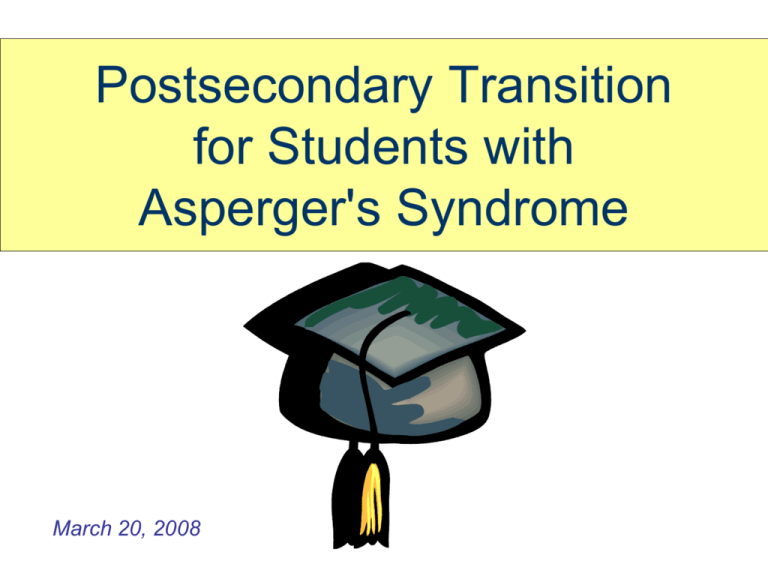
Postsecondary Transition for Students with Asperger's Syndrome March 20, 2008 Postsecondary Representatives Algonquin College: Centre for Students with Disabilities Karen Coffey Carleton University: Paul Menton Centre Laura Brawn Queen’s University: Disability Services Theresa Richard and Andrew Ashby University of Ottawa: Access Service Marie-Claude Rouleau and Nancy D’Louhy Contents 1. 2. 3. 4. 5. 6. 7. 8. Documentation Useful Information Possible Accommodations Available Supports Assistive Technology HS versus Postsecondary Parents’ Role in Success Student's Role in Success Documentation • Medical letter or certificate, or • Psychoeducational assessment report (especially if co-existing LD/ ADHD) • Signed by Physician, Psychologist, or Psychiatrist • Diagnostic statement Confidential Treatment of documentation as per the Privacy and Access to Information Act Useful Information • Impact on academics at postsecondary • Learning strengths (not just weaknesses) • Recommended accommodations & supports • History of educational supports (e.g. IEP) • Successful strategies used • Current psycho-educational assessment to assess learning strengths Possible Accommodations Individualized…for example… – Extra time for exams – Quiet location – Computer – Assistive technology – Notetaking support – Discuss alternatives to group projects, presentations, class participation requirements Available Supports • Disability Coordinator/ Counselor helps arrange accommodations, access to other supports, communicate with instructors • Ongoing Learning Strategy Support for… – – – – Time management and organization Writing – research, interpreting assignments, organizing ideas Notetaking and Reading – selecting main ideas Exam writing…etc. • Assist student in finding “safe” environment • Peer Mentor for academic and (possible) social knowledge of the environment • Personal counseling – social skills, emotional support • Career counseling Assistive Technology • Mind-mapping software (e.g. Inspiration®) • Voice-to-text Software (e.g. Dragon NS®) • Text-reading software (e.g. Kurzweil®) • Portable keyboard or laptop computer • PDA (portable digital assistant, a.k.a. “Palm Pilot”) • Digital recorder High School vs. Postsecondary • Familiar environment after 4 or more years •New environment (remember Grade 8 to Grade 9?) • Individualized Transition Program •Varies postsecondary institution to institution • No down time in the day •Plenty of down time between classes • Very loud place! •Quieter place • Many personal relationships with staff •Fewer personal relationships High School vs. Postsecondary • Limited Assistive Technology • Schedule similar each week • Course assignments not always known far in advance • Lots of group work in class •Excellent Assistive Technology options and funding •Schedule different every day •Course assignments set out in course outline at the beginning of classes •Some courses have NO group work—but mandatory in some courses High School vs. Postsecondary • High social demands from peers •Easier to choose social interactions with peers or not • Help whether you want it or not •You need to advocate for yourself to get help • Parental involvement in school •You are now considered an adult—limited parental involvement • Expectation that you take a full timetable •Many students only part time or take fewer courses Parents’ Role in Success • Help prepare them for this transition. • Work on self advocacy skills. • Help your son or daughter make the initial contact with the disability office. • Help them research the program they are applying to. • Consider the option of starting slowly. Student’s Role in Success • Actively participate in your support services • Utilize the support that is available • Keep your appointments • Keep up with the academic demands • Ask for help when you need it • Take responsibility for your learning Students with disabilities who are successful at postsecondary are: • • • • • • • • Motivated Take initiative Self sufficient Academically ready Have good study skills Accept responsibility Respect authority Good problem solvers Thank-you!
